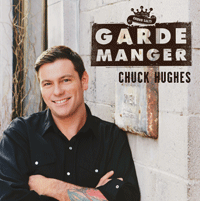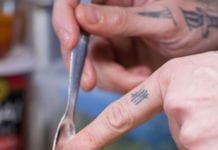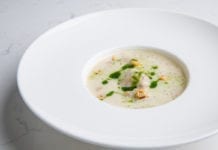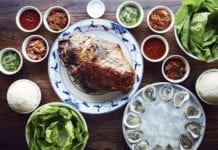Chuck Hughes is the kind of chef who wears his love of cooking on his sleeve — or in his sleeves, actually. Indeed, the co-owner of two of Old Montreal’s hottest restaurants — Garde Manger and Le Bremner — sports sizable tattoos of his favourite foods on his arms, such as lobsters, oysters and lemon meringue pie.
He even has the number “275” inked in large font, which might elicit nods of appreciation from other chefs. “That’s the perfect temperature to deep fry potato chips,” Hughes laughs. Building on a foundation of 20 years of hard restaurant work, the boyish chef with dimpled cheeks has realized a meteoric rise to success in recent years. He’s hosted three seasons of the Food Network series Chuck’s Day Off and has another, called Chuck’s Week Off, launching this month. He defeated Bobby Flay on Iron Chef America last year and recently published a cookbook titled Garde Manger (HarperCollins Canada), which captures the titular restaurant’s spirited, indie vibe and decadently hearty cuisine — imagine American comfort food meets bistro classics. “I dedicated the book to anyone who’s ever cooked on the line or washed dishes,” says Hughes. “They never get any respect, especially dishwashers.” With an attitude like that, we just had to hear more about the book and what drives Hughes’ career.
How would you describe your cooking philosophy?
Everything I cook is ingredient-driven. I like to improvise and cook on the fly. I love the fact that cooking is real and live and honest, and the second it’s done people eat it and either like it or don’t. Start with the very best ingredients and good technique, and half that battle is won.
What does “garde manger” mean to you?
The literal translation is “keeper of the food.” Of course, it’s the cold appetizer station, and it traditionally puts you in charge of the larder or pantry. Internally, I am a garde manger for life, because I see the bounty of nature as my pantry.
While writing this book, what’s the most interesting thing you learned about cooking?
When others are watching, you learn the most about what you’re doing. When I’m cooking, sometimes I don’t really know why I do things, I just know I have to do them. But when an editor’s asking why you’re doing this or that, it forces you to become introspective and analyze your methods.
What’s the most surprising thing you learned about writing a cookbook?
That I hate taking pictures. For me, cooking is an in-the-moment, living, breathing kind of thing. At the restaurant, maybe I’ll prepare salmon tartare slightly differently each day. But when you photograph it, you freeze it in time and to me that’s very anti-food, anti-cooking.
How should a chef or restaurateur use this book?
I would like them to use it the way I use cookbooks, which is not necessarily to follow exact recipes, but, as more of a guide, to give inspiration and as a launching point for their own creativity.
Do you have any advice for chefs or restaurateurs writing cookbooks?
Unlike every dish you ever make, this one is going to be lasting, so be honest and authentic.
Tell me about your new show Chuck’s Week Off
[It follows] me travelling through Mexico meeting locals and chefs, learning about the culture and food. I went across the country for two months in an old jeep with no doors. Yeah, I’m a lucky bastard. I have to pinch myself every morning. Is this really my life?
Keep Reading
Eat Raw, Eat Well Author Offers Advice on Vegan Cooking
In the Kitchen with CRFA’s Discovered Culinary Winner





















